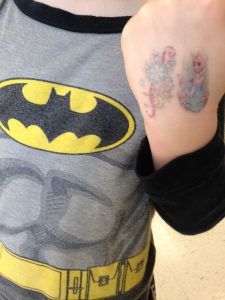By Emily Sexton—I read to my children every night. My kindergartner just turned 6, so there is nothing remarkable about that—we read picture books and early reader chapter series like Owl Diaries, the The Princess in Black and those never-ending Rainbow Magic fairy books, along with age appropriate-ish books about astronomy and math or whatever she is currently into.
More surprising for most people is that I still read to my rising 8th grader as well. We graduated from picture books and The Magic Tree House ages ago, but over the years it has proved to be a really fabulous experience on a lot of levels. I got the idea to just keep on reading together until he said he was ready to stop. This suggestion came from a former colleague who mentioned that he was reading A Conspiracy of Dunces with his high schooler. When my son was a reluctant reader, in part because he thought that we would stop reading to him once he learned to read, my promise to read with him as long as he wanted took on greater importance. Learning to read himself didn’t have to mean the end of reading aloud together.
There is research out there about the benefits of reading aloud to older kids, in both home life and educational contexts—kids process information differently when listening and reading aloud to them can expose them to deeper concepts and vocabulary than they might encounter on their own. But really, we just kept on doing it because we enjoy it. As he has gotten older and our lives have gotten busier, it is dedicated time for just the two of us—no little sister, no dad, no video games or mobile phones. Bedtime is still special, and it has become time when he can share things about his life that we might not talk about over the dinner table, big and small. Just the other night I told him about being on bed rest when I was pregnant with him and craving chocolate cupcakes. I haven’t a clue what prompted that conversation, but it was a joy.
As he has gotten older, in addition to popular favorites like Artemis Fowl and Percy Jackson, or classics like Oliver Twist, my son and I have explored series that are not necessarily on the most-read lists for tween boys—His Dark Materials, Fever Crumb—books with strong female protagonists that popular culture would tell us boys are not interested in pursuing. Reading together has also provided opportunities to discuss how literature intersects with our lives. We were reading To Kill a Mockingbird in spring of 2015 when Freddie Gray was relatively local news and we talked about the parallels between the book and current events and how many aspects of racial politics have changed depressingly little in 80 years. We are currently reading Octavia Butler’s Parable of the Talents and it was my son who pointed out the similarities between the fictional presidential candidate Jarrett and certain political candidates in the 2016 election.
Overall, this has also been an amazing way to not only share some of my favorite literature with my son, but to do so in a way that is more meaningful than handing him a book, suggesting he read it, and then asking him what he thought. He can ask questions about what we’re reading in real time and we can make connections to our lives and the world around us. Just as we’ve selected books based on his interests, reading together has sparked his curiosity about new things and helped identify activities and events of interest in our community. The profound conversations we had about To Kill a Mockingbird and Go Set a Watchman led me to take him to the opera Appomattox, which combined his well-established interest in military history with his new curiosity about the Civil Rights Movement. The powerful messages of the opera led us to the March autobiographical graphic novels about John Lewis (that we read independently, but talked about extensively).
I am certain that the clock is ticking down for this togetherness. Before long, my soon-to-be-teenager will decide that it’s time to stop having mom read to him every night. Maybe we’ll adapt—do things more casually, just on weekends, or just when we feel like it. Or maybe he’ll quit cold turkey and just kick me out of his room for good. I will be sad when that day comes, although I will get more sleep. I will always treasure this experience we’ve had together, and, more importantly, I think he will too.
_____________________________________________________________________
About the Author
Emily is: poet, wannabe novelist, lawyer, mother, Grounded Parents blogger, and she could do it all if only there were more hours in the day. She can usually be found nursing a beverage and reading something. You can find her on Twitter and Goodreads as emandink.



